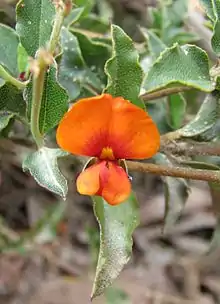Podolobium procumbens
Podolobium procumbens, commonly known as trailing shaggy-pea, trailing podolobium or trailing oxylobium,[2] is a flowering plant in the family Fabaceae and is endemic to south-eastern Australia. It is a trailing small shrub with oval-shaped leaves and orange pea-like flowers.
| Trailing shaggy-pea | |
|---|---|
 | |
| Podolobium procumbens in Castlemaine Diggings National Heritage Park | |
| Scientific classification | |
| Kingdom: | Plantae |
| Clade: | Tracheophytes |
| Clade: | Angiosperms |
| Clade: | Eudicots |
| Clade: | Rosids |
| Order: | Fabales |
| Family: | Fabaceae |
| Subfamily: | Faboideae |
| Genus: | Podolobium |
| Species: | P. procumbens |
| Binomial name | |
| Podolobium procumbens | |
| Synonyms[1] | |
Description
Podolobium procumbens is a low, spreading shrub to 0.3 m (1 ft 0 in) tall with smooth stems and forms a lignotuber. The leaves may be arranged opposite or in whorls, oval-shaped, 1–2.5 cm (0.39–0.98 in) long, 6–18 mm (0.24–0.71 in) wide, upper surface smooth, wavy, shiny and veined, lower surface with occasional hairs, pointed at the apex on a petiole 3 mm (0.12 in) long. The inflorescence are in small clusters at the end of branches or in leaf axils on a silky pedicel 4–10 mm (0.16–0.39 in) long. The bracteoles are narrow lance-shaped, the calyx 6–9 mm (0.24–0.35 in) long with flattened, soft, short hairs. The corolla 10–14 mm (0.39–0.55 in) long, orange with red markings, the standard petal almost orb-shaped, orange with a red centre, the wings orange, and the keel is reddish. Flowering occurs from November to January and the fruit is an oblong pod, 10–15 mm (0.39–0.59 in) long, either straight or curved, and covered with long, straight, soft hairs.[3][4]
Taxonomy and naming
Trailing shaggy-pea was first formally described in 1855 by botanist Ferdinand von Mueller who gave it the name Oxylobium procumbens in Definitions of rare or hitherto undescribed Australian plants.[5][6] In 1995 Michael Crisp and Peter Henry Weston changed the name to Podolobium procumbens and the change was published in Advances in Legume Systematics.[7] The specific epithet (procumbens) means "procumbent".[8]
Ferdinand von Mueller had previously published the name Podolobium procumbens in a report to the Victorian Government in 1853, but the name was not validly published because it was a nomen nudum, that is, there was no Latin description.[9][10]
Distribution and habitat
Trailing shaggy-pea occurs in sclerophyll forests and woodland in Victoria and south-eastern New South Wales.[3][4]
References
- "Podolobium procumbens". Australian Plant Census. Retrieved 17 August 2021.
- Wild Plants of Victoria (database). Viridans Biological Databases & Department of Sustainability and Environment. 2009.
- "Podolobium procumbens". VICFLORA-Flora of Victoria. Royal Botanic Gardens Victoria. Retrieved 15 August 2021.
- "Podolobium procumbens". PlantNET - New South Wales Flora Online. Royal Botanic Gardens & Domain Trust, Sydney Australia. Retrieved 2 December 2012.
- "Oxylobium procumbens". Australian Plant Name Index. Retrieved 17 August 2021.
- von Mueller, Ferdinand (1855). Definitions of rare or hitherto undescribed Australian plants. Melbourne: Goodhugh & Trembath. p. 4. Retrieved 17 August 2021.
- "Podolobium procumbens". Australian Plant Name Index. Retrieved 17 August 2021.
- Sharr, Francis Aubi; George, Alex (2019). Western Australian Plant Names and Their Meanings (3rd ed.). Kardinya, WA: Four Gables Press. p. 283. ISBN 9780958034180.
- "Podolobium procumbens". Australian Plant Name Index. Retrieved 17 August 2021.
- von Mueller, Ferdinand (20 October 1853). "First general report of the Government Botanist on the vegetation of the colony". Victoria - Parliamentary Papers- Votes and Proceedings of the Legislative Assembly: 12. Retrieved 17 August 2021.